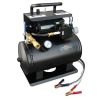Solinst Model 464 Electronic Pump Controller
Features
- Ideal for use with Model 407 bladder pumps or Model 408 double valve pumps
- 99 customizable sampling presets
- Can be used in automatic or manual mode
- Free ground shipping
- Expedited repair and warranty service
- Lifetime technical support
- More
Overview
The Solinst Model 464 Electronic Pump Controller is available in 125 psi or 250 psi versions, and uses 4 AA alkaline batteries that last up to 100 hours of normal use. These Controllers can also be operated manually if batteries run out in the field, using only a compressed gas source.
Mechanics
The 464 Electronic Pump Control Unit has automatic preset sample modes from low through high flow settings. In addition, up to 99 user-created flow rates can be saved in FRAM memory. The Pump Control Unit allows faster purge rates and precise low flow control to ensure a representative sample at 100 ml/min or less when sampling for VOCs (Volatile Organic Compounds).
Design
These convenient Pump Control Units are rugged, dependable and suitable for all environments. Quick-connect fittings allow instant attachment to dedicated well caps, portable reel units and to an air compressor or compressed gas source.
In The News
Monitoring Mariculture in the Gulf of Alaska
The mariculture industry in the Gulf of Alaska has been steadily growing in recent years, guided by ongoing research to help refine farm location and cultivation practices. A subset of aquaculture, mariculture focuses on rearing organisms in the open ocean. In Alaska, finfish farming is illegal, so most farms cultivate kelp, oysters, or a combination of the two. These small, locally operated farms started popping up in the Gulf of Alaska in the early 1990s, when shellfish farming first became legal. Kelp farming did not begin to catch on in the state until 2016. Many of the coastal areas that have grown interested in mariculture are historically commercial fishing communities.
Read MoreSupplying Seattle’s Drinking Water: Using Data Buoys to Monitor the Cedar River Municipal Watershed
Providing clean, safe, and reliable drinking water for the 1.6 million people in the greater Seattle area is a top priority for Seattle Public Utilities (SPU). With limited water supplies, SPU dedicates considerable resources to maintain its watersheds and mountain reservoirs. About 70 percent of Seattle Water comes from the Cedar River Municipal Watershed , and the other 30 percent comes from the South Fork Tolt River Watershed . [caption id="attachment_39574" align="alignnone" width="940"] Data buoy in Chester Morse Lake . (Credit: Kevin Johnson / Seattle Public Utilities) [/caption] Jamie Thompson, a fisheries biologist at SPU, monitors aquatic ecosystems centered on fish listed under the U.S. Endangered Species Act (ESA).
Read MoreData-Driven Advocacy on the Lower Deschutes River
Like many freshwater environments, the Deschutes River in Oregon is under pressure from development, pollution, and climate change. Many rivers, streams and lakes in the Deschutes Basin do not meet Oregon water quality standards –where state water quality monitoring assesses levels of bacteria, pH, dissolved oxygen, temperature, and fine sediment. Hannah Camel is the Water Quality Coordinator for the Deschutes River Alliance (DRA), a non-profit organization that focuses on the health of the lower 100 miles of the Deschutes River–the area most affected by human intervention. As a data-driven organization, the DRA has benefited from the installation of two NexSens X2 data loggers.
Read More



















